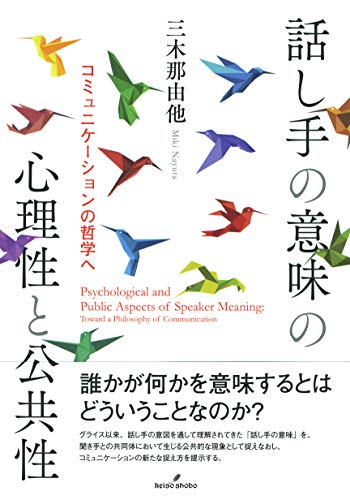16 0 0 0 OA 会話の格率の三つの破りかた —行為の理論としての会話的推意の理論—
- 著者
- 三木 那由他
- 出版者
- 科学基礎論学会
- 雑誌
- 科学基礎論研究 (ISSN:00227668)
- 巻号頁・発行日
- vol.49, no.1, pp.33-48, 2021 (Released:2021-12-14)
- 参考文献数
- 14
In the process of presenting his theory of conversational implicature, Paul Grice (1975) segmented cases of conversational implicature into three groups: Group A, where no maxims are violated; Group B, where the violation of a maxim is to be explained by the supposition of a clash with another maxim; and Group C, which involves the exploitation of a maxim. Yukiko Kawaguchi, however, claimed in her 2001 article that this categorization is ill-grounded. This paper proposes, in opposition to Kawaguchi, an interpretation of Grice’s theory of conversational implicature which accords with his treatment of conversational implicature and provides reasonable evidence in support of his categorization of it.
9 0 0 0 OA 意図の無限後退問題とは何だったのか
- 著者
- 三木 那由他
- 出版者
- The Philosophy of Science Society, Japan
- 雑誌
- 科学哲学 (ISSN:02893428)
- 巻号頁・発行日
- vol.52, no.1, pp.47-65, 2019-12-30 (Released:2020-06-20)
- 参考文献数
- 20
Intention-based semantics (IBS) serves as the paradigm in the field of speaker meaning analysis. However, it has grappled with a well-known problem: the infinite regress of a speaker’s intentions. Theorists such as Grice, Schiffer, Davis, and Green have tried to remedy the situation; however, no one has found any solutions until now. The present paper claims that the inability of IBS theorists to resolve the regress problem may be attributed to the conflict between two basic assumptions that they espouse: representationalism and the transparency of speaker meaning. When both are adopted alongside each other, as the current paper shows, the regress problem immediately emerges. It follows, then, that it would be prudent to reject IBS to sufficiently analyze speaker meaning.
6 0 0 0 OA 理性による意味の基礎づけ--グライスにおける意味
- 著者
- 三木 那由他
- 出版者
- 京都大学哲学論叢刊行会
- 雑誌
- 哲学論叢 (ISSN:0914143X)
- 巻号頁・発行日
- vol.36, pp.68-79, 2009
6 0 0 0 OA <論文>グライスにおける語用論的プロセス -推意に関するもう一つの誤解-
- 著者
- 三木 那由他
- 出版者
- 京都大学哲学論叢刊行会
- 雑誌
- 哲学論叢 (ISSN:0914143X)
- 巻号頁・発行日
- vol.39, pp.86-97, 2012
2 0 0 0 OA 書評 中山康雄:『言葉と心』(勁草書房, 2007, xiv+227p.)
- 著者
- 三木 那由他
- 出版者
- 京都大学哲学論叢刊行会
- 雑誌
- 哲学論叢 (ISSN:0914143X)
- 巻号頁・発行日
- vol.34, pp.126-129, 2007
- 著者
- 三木 那由他
- 出版者
- 科学基礎論学会
- 雑誌
- 科学基礎論研究 (ISSN:00227668)
- 巻号頁・発行日
- vol.49, no.1, pp.33-48, 2021
<p>In the process of presenting his theory of conversational implicature, Paul Grice (1975) segmented cases of conversational implicature into three groups: Group A, where no maxims are violated; Group B, where the violation of a maxim is to be explained by the supposition of a clash with another maxim; and Group C, which involves the exploitation of a maxim. Yukiko Kawaguchi, however, claimed in her 2001 article that this categorization is ill-grounded. This paper proposes, in opposition to Kawaguchi, an interpretation of Grice's theory of conversational implicature which accords with his treatment of conversational implicature and provides reasonable evidence in support of his categorization of it.</p>
1 0 0 0 IR 理性による意味の基礎づけ--グライスにおける意味
- 著者
- 三木 那由他
- 出版者
- 京都大学哲学論叢刊行会
- 雑誌
- 哲学論叢 (ISSN:0914143X)
- 巻号頁・発行日
- no.36, pp.68-79, 2009
1 0 0 0 グライスにおける語用論的プロセス : 推意に関するもう一つの誤解
- 著者
- 三木 那由他
- 出版者
- 京都大学哲学論叢刊行会
- 雑誌
- 哲学論叢 (ISSN:0914143X)
- 巻号頁・発行日
- no.39, pp.86-97, 2012
1 0 0 0 話し手の意味の心理性と公共性 : コミュニケーションの哲学へ
1 0 0 0 OA <論文>個体概念説による固有名の意味論
- 著者
- 三木 那由他
- 出版者
- 京都大学哲学論叢刊行会
- 雑誌
- 哲学論叢 (ISSN:0914143X)
- 巻号頁・発行日
- vol.38, pp.156-167, 2011
- 著者
- 三木 那由他
- 出版者
- Japanese Association for the Contemporary and Applied Philosophy (JACAP)
- 雑誌
- Contemporary and Applied Philosophy (ISSN:18834329)
- 巻号頁・発行日
- vol.9, pp.33-65, 2017-07-31
掲載日: 2017.7.31
1 0 0 0 OA 談話表示理論の展開--形式意味論の前線
- 著者
- 三木 那由他
- 出版者
- 京都大学哲学論叢刊行会
- 雑誌
- 哲学論叢 (ISSN:0914143X)
- 巻号頁・発行日
- vol.36, pp.104-115, 2009
